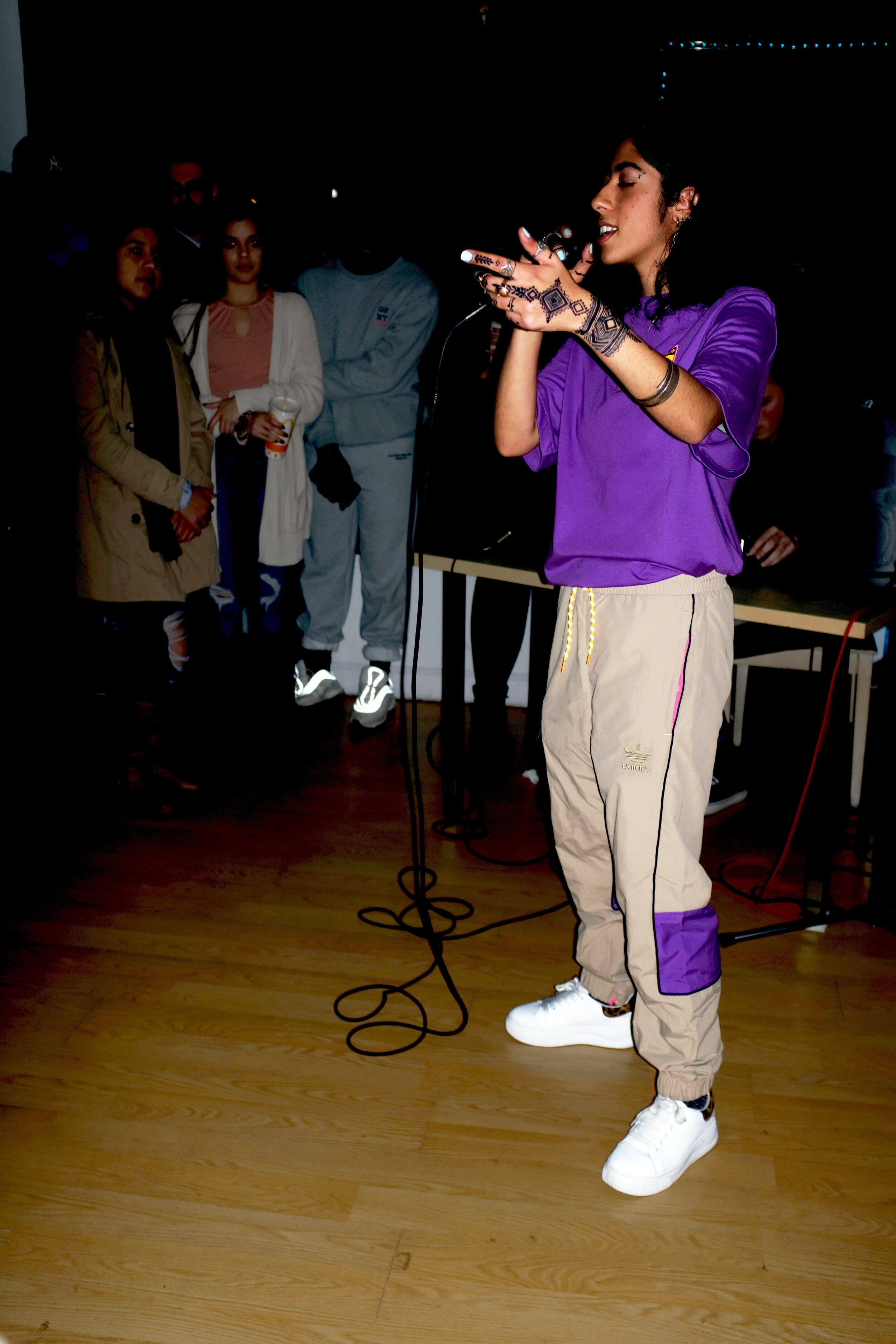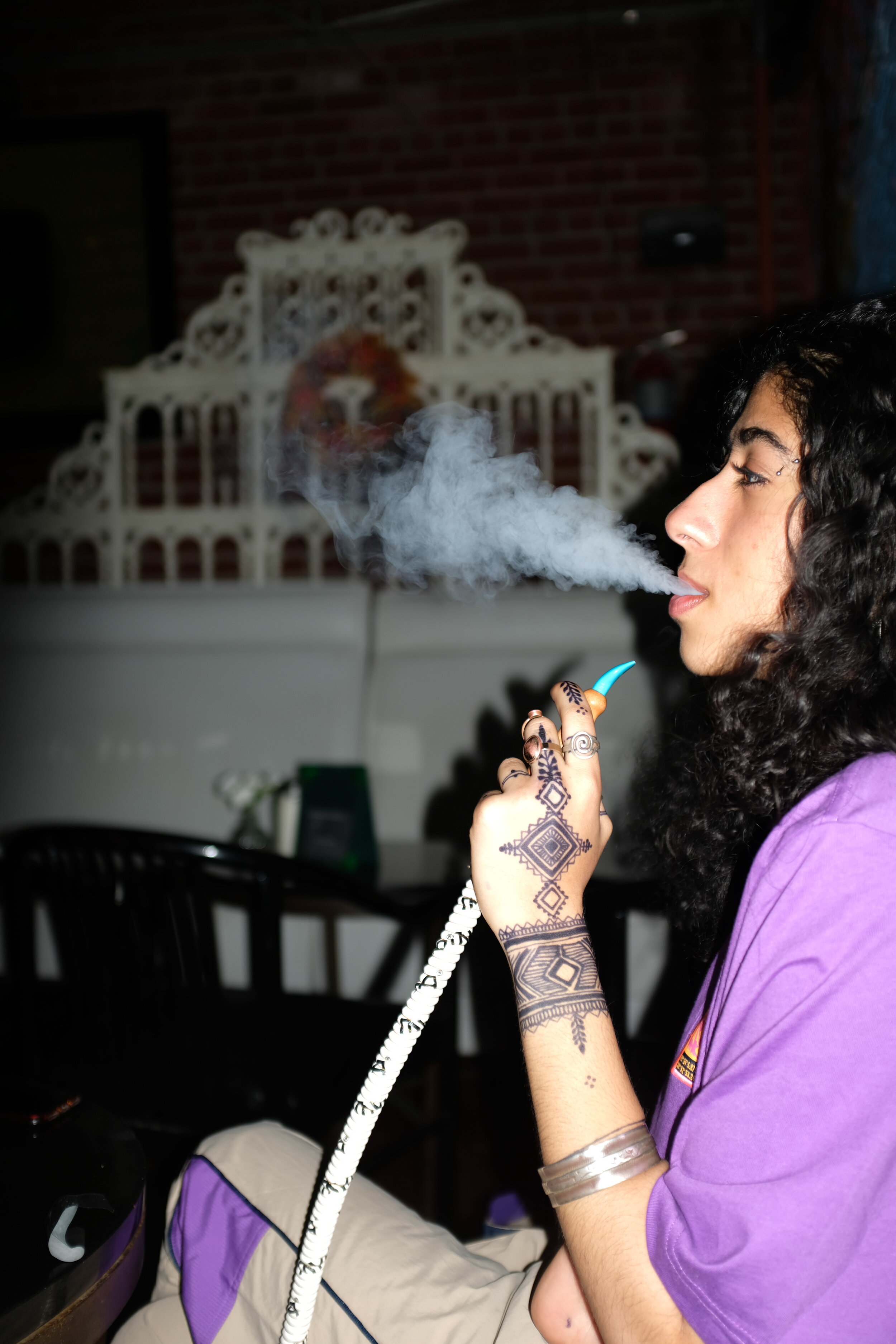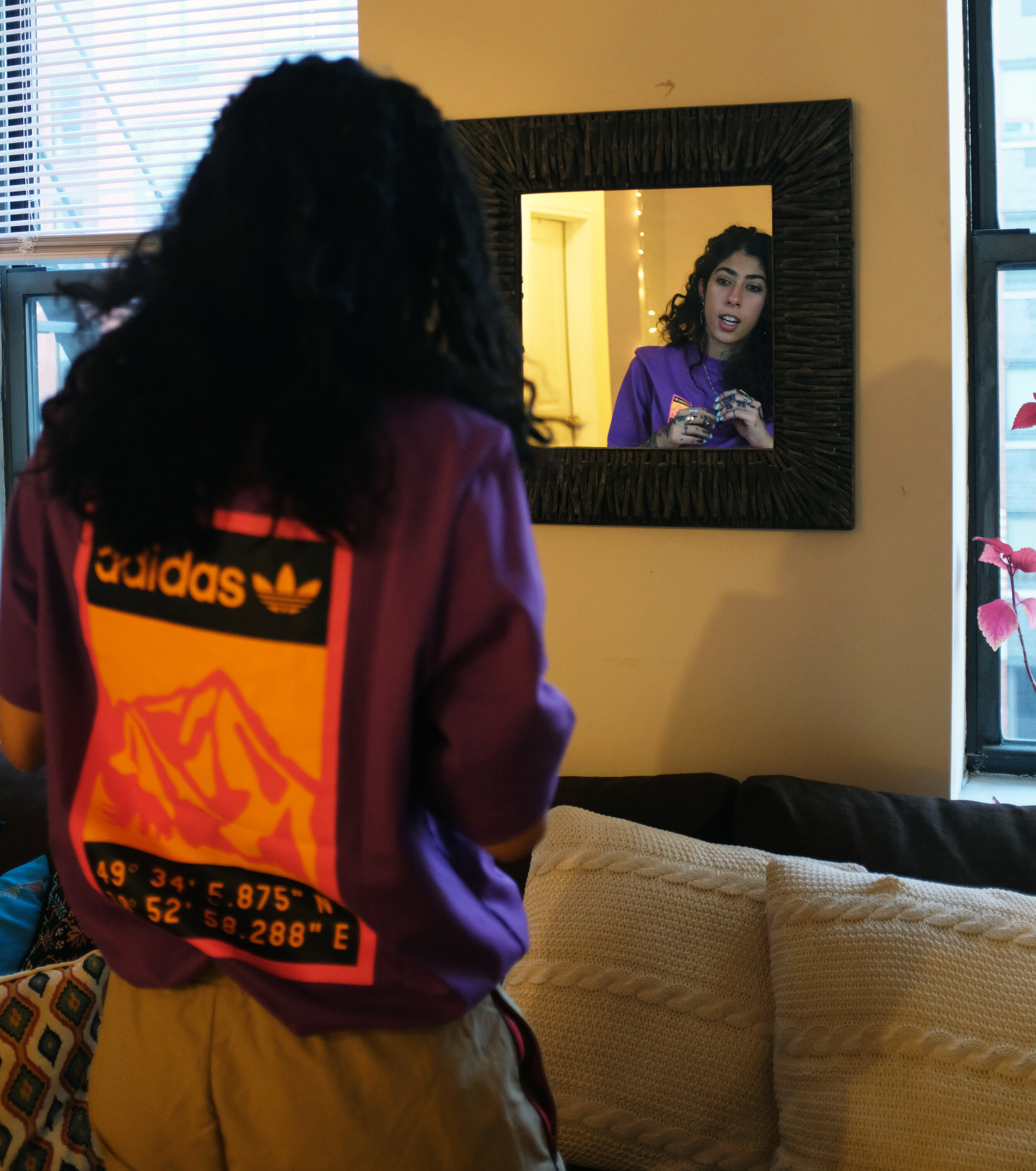FELUKAH: Cairo's female rapper inspiring a new wave of Egyptian women
Words and Images by Noor Kalouti, edited by Jameela Elfaki
Her hands are decorated with swirling shapes drawn in Jagua ink, a darker version of henna. She paces the room, tea in-hand, wearing a baggy purple Adidas tracksuit sprinkled with turquoise and beige, and a purple tee underneath ”because purple is a mix of red and blue—it’s the in-between.” Dubbed her “purple philosophy” (also the title of her first single) Felukah says she wants to “own the space in-between—own that grey—both culturally and psychologically.” She sips her tea. “I fly between two cities, constantly, and both are really close to me.” Another sip. “And I’m not, not anything.”
Born Sara El Messiry, the 21-year-old rapper was born and raised outside Cairo, a city largely considered the Hollywood of the Middle East. Moving to New York when she was 18, Felukah confronted the supposed contradictions of an Americanised Arab woman.
She renamed herself Felukah after the traditional Egyptian boat that travels the Nile, embodying both her heritage and “ride the wave’ mentality.
For months, Egyptian hip-hop has been on the rise. Spotify’s new “Rap Egypt” playlist includes flourishing trap artists like Wegz and Marwan Pablo, but Felukah is the only woman in the rap-game and on the playlist. In October, she released her debut album “Citadel”— a neo-soul, boom-bap record reminiscent of early Lauryn Hill or Erykah Badu, on which she raps in English and Arabic with the ease of flowing water.
Today, she’s performing at Dacia, an intimate gallery in the Lower East Side, for the clothing brand Good Style New York’s launch event. “Yalla Hanna!” Felukah calls to her sister to get dressed, then returns to muttering verses and tidying the Harlem apartment where all three of the El-Messiry siblings live, including her brother Malik.
She moved to New York in 2017, with her brother, of course, to study creative writing at The New School and then Hunter College. Because she was the family rebel, Felukah’s family was comforted by her brother’s presence. In New York. Felukah began to explore herself as an artist, starting at the Nuyorican Poets Café on 3rd Street where she had her first performance.
These days, she works with a range of Egyptian producers, (many reach out through Instagram), paying them for beats, then recording in her home studio. Her day jobs include babysitting, tutoring English, and waitressing at Morandi’s on Waverly Place.
“Soundcheck is at 5:30!” Felukha yells at 5:00 pm while flinging a sweater across the living room to her bedroom—a corner walled off by a packed bookshelf. “I brought them all from Cairo,” Felukah says proudly of her books, including her self-published poetry chapbooks “Other Beating Wings” and “Flowers for Zoë,” written under her pen-name Kahirati (“my Cairo” in Arabic).
“Other Beating Wings”, published last year, was the first project to demonstrate her multicultural art. “The space between both my ethnicities is a valid space,” she explains in the foreword. “Here I am choosing sky over ground and exploring the infinite possibilities..” Her poetry includes Arabic and English poems, and in her books “equal page real-estate was given to both languages.”
By 7:30 PM, the small Stanton Street gallery is crowded, and two rappers have already performed. Her brother arrives on time to hear the MC introduce Felukah: “We have a female rapper with us tonight!” But focused Felukah is unphased; she’s been rehearsing all day to include her two unreleased singles “Questions” and “Give Her A Moment.” Mic feedback interrupts her first few songs, but closing her eyes seemed to remind her of why she was performing. The gallery’s tight space broke down the usual boundaries between performer and audience; fans shouted “Yes girl” at lyrics that resonated and Felukah smiled with genuine gratitude.
She performs her most streamed song “Ask the Birds in Cairo”— a tune about the connections between flying and feeling inspired—to a crowd that can only partially understand her. In the last verse of “Questions” at the end of the show she says “Your knowledge is weak, it’s a new wave of post-revolution art. Masry—Masreya.” Masreya is a woman of Egyptian descent, while Masry is the masculine form.
After the applause, Felukah eagerly approaches a curly-haired teenage girl hidden in the crowd, who’s come all the way from Yonkers to listen to her favourite artist. “She’s Egyptian and I had a feeling she was here for me, not any of the other guys,” Felukah explains.“She knew all the words!... It’s amazing to see that that’s what my demographic looks like. A girl that used to look like me in eighth grade. It just felt amazing, this is why I don’t get in my head about the streams or the money. Seeing her is what makes it all worth it.”
As the home of Um Kulthum— a legendary vocalist and national icon from the 1930’s— Egypt has a long reputation for fostering female artists, including vocalists, actresses, and belly-dancers, but all within the limits of gender expectations. “A lot of her work de-stigmatized things that Arab women, especially, have to go through on a daily basis,” said Hanna El Missery, Felukah’s 19-year-old sister. “What you wear, what you say, and how you present yourself to the world—we’re constantly scrutinised.” She adds, “it’s easy to acknowledge the fact that women in the Middle East need to be treated better but are we doing anything about it? She is.”
An artist like Felukah is redefining the ways an Arab female artist can express herself. Everything from her tomboy aesthetic to her confrontational lyrics rebels against both Egyptian President Abdel Farrah El-Sisi’s political climate and the region’s cultural norms. Though she says she has no intention of being political, the change Felukah hopes to inspire will be seen that way. Considering Egypt’s recent history of protests, Felukah’s art comes at a crucial time for Cairo’s youth.
Later, leisurely smoking a hookah at Cloister Café and chatting with friends about the show, Felukah morphs back into a college-student with sparkly dreams. Unlike most 21-year-olds, she’s already made an impact, especially in the lives of young Arab women that follow her.
“The trap scene is really bubbling in Egypt” says Rami Afuni, a music-executive and expert on hip hop in the Middle East. “Felukah has an advantage over local artists in Egypt; she raps in English and Arabic and can reach both markets.” he adds, “she’s doing something different, something we haven’t seen from an Arab female artist yet.”
In six months, after graduating she’ll move back to Egypt, and dive headfirst into her music, seeking a manager, along with a team of like-minded artists and producers, who know what it means to be “Egyptian and a woman.” Her next album will include collaboration with other Egyptian women.
“People are waiting for us to deliver this content” she says puffing on her hookah, “I hope that my music inspires confidence in Egyptian women to express themselves however they see fit.”
You can follow Felukah here


